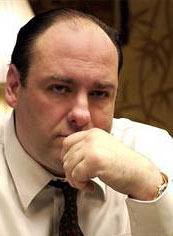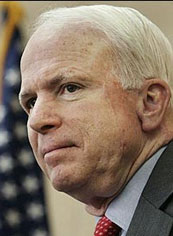 I must confess, like many devoted “Sopranos” viewers, I did not return to the show this season. It wasn’t Season Six’s much-reviled metaphysical and spiritual meanderings that deterred me, but the fact that HBO was offering up tastier fare, such as “Rome,” while making us endure yet another lengthy, memory-challenging “Sopranos” hiatus. So, when I read Entertainment Weekly critic Lisa Schwarzbaum’s effusive review of last Sunday’s show, I had to fire up the HBO-On-Demand and see what she was talking about.
I must confess, like many devoted “Sopranos” viewers, I did not return to the show this season. It wasn’t Season Six’s much-reviled metaphysical and spiritual meanderings that deterred me, but the fact that HBO was offering up tastier fare, such as “Rome,” while making us endure yet another lengthy, memory-challenging “Sopranos” hiatus. So, when I read Entertainment Weekly critic Lisa Schwarzbaum’s effusive review of last Sunday’s show, I had to fire up the HBO-On-Demand and see what she was talking about.
“Walk Like a Man” was an episode meant for the embrace of the “Sopranos” purist–full of death and double-dealings, Sturm and Drang. A.J. is nursing a suicidal broken heart after being dumped by his fiancée Blanca, and Tony, who can’t successfully deal with the fact that he’s still in therapy and experiencing some guilt-riddled denial about A.J.’s depression, decides that the best way to help his son is to send him out with some college-aged junior good fellas to the Bada Bing. Who needs Prozac when you have naked chicks, right? Meanwhile, Christopher falls off the AA wagon in a big way–unless that esteemed organization has changed step twelve to shooting your one-time sponsor in the head.
Granted, the episode was very well-acted, and its depiction of the many faces of depression and the guilt of passing that predisposition on to your children was true to life, but it’s nothing new for the show. It’s the same old “Sopranos.” The conceit of an unrepentant gangster seeking psychotherapy — America’s secular spirituality — was original and inventive, but now episodes tend to fall into the same morality tale rut: Absolute power corrupts absolutely.
Whether it’s Tony Blundetto trying to be a massage therapist, Christopher Moltisanti trying to stay sober, or Tony himself saying “Every day is a gift, but does it have to be a pair of socks?”, the show has become a monotonous mantra, a shaggy-dog story, of men falling deeper into corruption even as they fail at reformation–many of them failing to live in the “real” world and returning to the fold or vocations of violence, because years and years of corruption and criminality have made them too lazy, selfish, and cruel to overcome it.
As one friend of mine (and long-time viewer of the show) lamented, “It’s enormously depressing most of the time, particularly in its allegorization of Baby Boomer frustrations with marriage, children, and work.”
Perhaps most depressing of all is that A.J.’s dark mood only seemed to lift after helped torture a boy who welched on a bet, by holding him down while his friends poured sulfuric acid on his toes. It seems A.J. takes after his Dad, and almost every member of Tony’s family, in that way–railing against others when faced with inner conflict. In fact, Tony tells Dr. Melfi that he has passed on his proclivity for depression to A.J., saying, “I’ve infected my kid’s soul! That’s my gift to my son!”
In a nice bit of irony, A.J. and Tony are watching the movie “Hellfighters,” starring John Wayne (whom Tony refers to in his therapy sessions as an excellent role model), which couldn’t sum up the episode better. Each man battling his own personal hell. And while it was a comforting return to form for the show, I’m hoping for a little more redemption than recidivism in its final season; although that may be the depressing conclusion.


